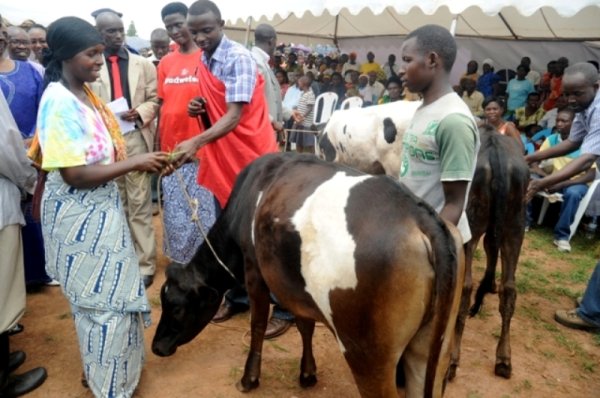Rwanda, a nation known for its rolling hills and rich cultural heritage, boasts numerous traditions that have shaped its society for generations. Among these, the practice of “Umuco wo Guhana Inka” stands out as a profound symbol of unity, generosity, and cultural identity. Translating to “the culture of giving cows,” this custom not only reflects the agrarian roots of the Rwandan people but also embodies the values of community and kinship that are deeply woven into the fabric of Rwandan life.
Historical Background
The origins of “Umuco wo Guhana Inka” can be traced back to pre-colonial Rwanda. Cattle, or “Inka,” have always held a place of high esteem in Rwandan society. They are seen not merely as livestock but as symbols of wealth, status, and prosperity. The act of giving a cow, therefore, goes beyond a mere exchange; it is a gesture laden with social, economic, and spiritual significance.
Historically, cows were central to the economy and daily life of Rwandans. They provided milk, meat, and hides, but perhaps most importantly, they were a source of pride and a measure of one’s social standing. In traditional Rwandan society, owning cattle was a sign of affluence, and the more cows one had, the higher their status within the community.
Cultural Significance
The practice of “Guhana Inka” transcends mere material exchange. It is a cultural ritual that cements relationships, fosters communal ties, and reinforces social hierarchies. When a cow is given, it is often accompanied by ceremonial activities that include songs, dances, and speeches, all of which celebrate the bond being strengthened or the gratitude being expressed.
Ceremonial Exchange
Typically, the ceremony begins with the hosting family preparing a feast, inviting friends, relatives, and community leaders. The cow, adorned with traditional ornaments, is presented in a procession, highlighting its importance and the honor being bestowed. The recipient, in turn, expresses their gratitude through gifts, poetry, or speeches, marking the mutual respect and commitment between the giver and the receiver.
Social Ties and Kinship
“Guhana Inka” is deeply rooted in the concepts of “ubumwe” (unity) and “ubwuzuzanye” (mutual support). The act of giving a cow is a way to forge and strengthen alliances, whether between families, clans, or even entire communities. It is common for cows to be exchanged during significant life events such as marriages, births, or even in resolving disputes, symbolizing peace and reconciliation.
Modern Interpretations
In contemporary Rwanda, the practice of “Guhana Inka” continues to hold significant meaning, even as the nation modernizes. While the urbanization and economic transformation have changed the dynamics of rural life, the essence of this tradition remains vibrant.
Economic Empowerment
Today, “Guhana Inka” also plays a role in economic empowerment. Development programs in Rwanda have adapted this age-old practice to foster economic resilience among rural communities. For instance, initiatives like the “Girinka” program, introduced by the government, aim to provide cows to impoverished families to improve their livelihoods. This program reflects the spirit of “Guhana Inka,” encouraging self-reliance and community solidarity.
Cultural Preservation
Efforts are also being made to preserve and promote this cultural heritage among younger generations. Educational programs and cultural festivals often highlight the significance of “Guhana Inka,” ensuring that its values of generosity, respect, and community are not lost. The Rwandan government and cultural organizations actively work to keep this tradition alive, viewing it as an integral part of the nation’s identity.
Challenges and Adaptations
Despite its enduring significance, “Guhana Inka” faces challenges in the modern era. Urbanization and changing economic structures have shifted the centrality of cattle in daily life. Additionally, the practice has had to adapt to legal and environmental considerations, as land for grazing becomes limited and the balance between traditional practices and sustainable development is sought.
However, the resilience of this tradition lies in its adaptability. Rwandans have found innovative ways to uphold the spirit of “Guhana Inka” in modern contexts, whether through symbolic gestures or integrating it into contemporary economic and social frameworks.
The tradition of “Umuco wo Guhana Inka” is more than a cultural relic; it is a living testament to the values and spirit of the Rwandan people. It represents a bridge between the past and the present, connecting generations through acts of generosity and solidarity. As Rwanda continues to evolve, the essence of “Guhana Inka” remains a beacon of the nation’s enduring commitment to unity and communal prosperity.
Through the lens of this practice, we gain insight into the deep-seated values that have shaped and continue to shape Rwandan society. “Umuco wo Guhana Inka” is a powerful reminder that in giving, communities find strength, resilience, and a shared sense of identity.
Sources:
1. [National Institute of Statistics of Rwanda](http://www.statistics.gov.rw)
2. [Rwanda Development Board](https://www.rdb.rw)
3. [Rwanda Cultural Heritage Academy](https://www.rcah.rw)
4. [GIRINKA Program](https://www.minagri.gov.rw/index.php?id=196&tx_news_pi1%5Bnews%5D=173&tx_news_pi1%5Bday%5D=19&tx_news_pi1%5Bmonth%5D=4&tx_news_pi1%5Byear%5D=2019&cHash=a52886a169760f8e1aeb57dc7dbbbf67)

